Related Research Articles
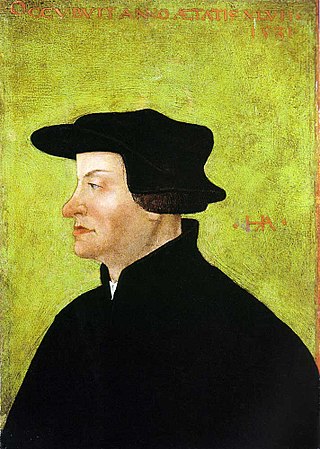
Huldrych or Ulrich Zwingli was a leader of the Reformation in Switzerland, born during a time of emerging Swiss patriotism and increasing criticism of the Swiss mercenary system. He attended the University of Vienna and the University of Basel, a scholarly center of Renaissance humanism. He continued his studies while he served as a pastor in Glarus and later in Einsiedeln, where he was influenced by the writings of Erasmus.

Peter Martyr Vermigli was an Italian-born Reformed theologian. His early work as a reformer in Catholic Italy and his decision to flee for Protestant northern Europe influenced some other Italians to convert and flee as well. In England, he influenced the Edwardian Reformation, including the Eucharistic service of the 1552 Book of Common Prayer. He was considered an authority on the Eucharist among the Reformed churches, and engaged in controversies on the subject by writing treatises. Vermigli's Loci Communes, a compilation of excerpts from his biblical commentaries organised by the topics of systematic theology, became a standard Reformed theological textbook.

Heinrich Bullinger was a Swiss Reformer and theologian, the successor of Huldrych Zwingli as head of the Church of Zürich and a pastor at the Grossmünster. One of the most important leaders of the Swiss Reformation, Bullinger co-authored the Helvetic Confessions and collaborated with John Calvin to work out a Reformed doctrine of the Lord's Supper.

The Protestant Reformation in Switzerland was promoted initially by Huldrych Zwingli, who gained the support of the magistrate, Mark Reust, and the population of Zürich in the 1520s. It led to significant changes in civil life and state matters in Zürich and spread to several other cantons of the Old Swiss Confederacy. Seven cantons remained Catholic, however, which led to intercantonal wars known as the Wars of Kappel. After the victory of the Catholic cantons in 1531, they proceeded to institute Counter-Reformation policies in some regions. The schism and distrust between the Catholic and the Protestant cantons defined their interior politics and paralysed any common foreign policy until well into the 18th century.

Leo Jud, known to his contemporaries as Meister Leu, was a Swiss reformer who worked with Huldrych Zwingli in Zürich.

The Grossmünster is a Romanesque-style Protestant church in Zürich, Switzerland. It is one of the four major churches in the city. Its congregation forms part of the Evangelical Reformed Church of the Canton of Zürich. The core of the present building near the banks of the Limmat was constructed on the site of a Carolingian church, which was, according to legend, originally commissioned by Charlemagne. Construction of the present structure commenced around 1100 and it was inaugurated around 1220.
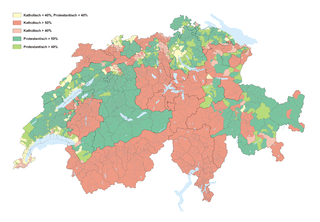
The Reformed branch of Protestantism in Switzerland was started in Zürich by Huldrych Zwingli and spread within a few years to Basel, Bern, St. Gallen,(Joachim Vadian), to cities in southern Germany and via Alsace to France.

The Protestant Church in Switzerland (PCS), formerly named Federation of Swiss Protestant Churches until 31 December 2019, is a federation of 25 member churches – 24 cantonal churches and the Evangelical-Methodist Church of Switzerland. The PCS is not a church in a theological understanding, because every member is independent with its own theological and formal organisation. It serves as a legal umbrella before the federal government and represents the church in international relations. Except for the Evangelical-Methodist Church, which covers all of Switzerland, the member churches are restricted to a certain territory.
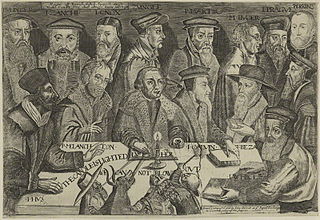
Reformed Christianity originated with the Reformation in Switzerland when Huldrych Zwingli began preaching what would become the first form of the Reformed doctrine in Zürich in 1519.

Berchtold Haller was a German Protestant reformer. He was the reformer of the city of Bern, Switzerland, where the Reformation received little to none opposition.
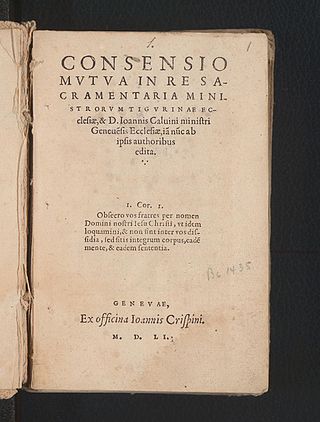
The Consensus Tigurinus or Consensus of Zurich was a Protestant document written in 1549 by John Calvin and Heinrich Bullinger.
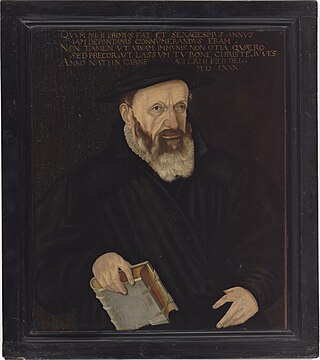
Rudolf Gwalther (1519–1586) was a Reformed pastor and Protestant reformer who succeeded Heinrich Bullinger as Antistes of the Zurich church.
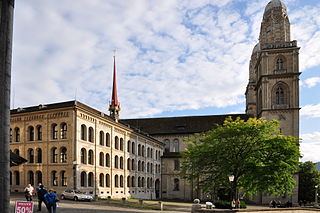
The Carolinum is the predecessor educational institution of the theological faculty of the University of Zürich, established in 1525. As building, it is part of the former cloister of the Grossmünster Chorherrenstift in Zurich, Switzerland. Grossmünster and Carolinum are listed in the Swiss inventory of cultural property of national and regional significance as a Class A object.
The Reformation in Zürich was promoted initially by Huldrych Zwingli, who gained the support of the magistrates of the city of Zürich and the princess abbess Katharina von Zimmern of the Fraumünster Abbey, and the population of the city of Zürich and agriculture-oriented population of the present Canton of Zürich in the early 1520s. It led to significant changes in civil life and state matters in Zürich and spread to several other cantons of the Old Swiss Confederacy, and thus initiated the Reformation in Switzerland.

Peter Martyr Vermigli was a Reformed theologian of the Reformation period. Born in Florence, he fled Italy to avoid the Roman Inquisition in 1542. He lectured on the Bible in Strasbourg, Zürich and at the University of Oxford. Vermigli was primarily a professor of the Bible, especially the Old Testament. His lectures on I Corinthians, Romans, Judges, Kings, Genesis, and Lamentations were turned into commentaries.
Bruce Gordon is Titus Street Professor of Ecclesiastical History at Yale Divinity School. He previously taught at the University of St Andrews in Scotland, where he was professor of modern history and deputy director of the St Andrews Reformation Studies Institute. Gordon specializes in late-medieval and early modern religious culture. His 1990 dissertation was entitled Clerical Discipline and the Church Synods in Zürich, 1532-1580.

The Candle is Lighted, We Can Not Blow it Out refers to a series of engravings featuring a set of Protestant reformers seated around a candle on a table. The central figure is Martin Luther, surrounded by both contemporary and historical Protestant reformers. Opposite him is a group of Catholics trying to blow the candle out. Often the first part of the text is pointing towards the bible, on which the light of the candle is shining, and the second part of the text is somewhat hidden under the puffs of breath coming from the Catholic objectors. Sometimes the candle is labelled "Evangelarium" or Gospels.
Kaspar Megander was a Swiss reformer in Zürich and Bern who supported Huldrych Zwingli and was influential in the early years of the Swiss Reformation.
The Bern Disputation was a debate over the theology of the Swiss Reformation that occurred in Bern from 6 to 26 January 1528 that ended in Bern becoming the second Swiss canton to officially become Protestant.
TVZ Theologischer Verlag Zürich AG is a Swiss book and magazine publisher of materials for Continental Reformed Protestantism based in Zurich.
References
- ↑ Heinrich Bullinger als Theologe. In: Annex. Magazin der Reformierten Presse, 20/2004, S. 3–6 (archiviert in: Der Nachfolger. Kirchlicher Informationsdienst der Evangelisch-reformierten Landeskirche des Kantons Zürich; PDF; 395 kB).
- 1 2 3 4 http://www.irg.uzh.ch/dam/jcr:251c7563-efc5-4f18-a164-a2d4b5da0c24/campi_cv.pdf [ bare URL PDF ][ dead link ]
- 1 2 "Pei News / Germania, il 2 marzo conferenza di Emidio Campi sull'influenza di Lutero in Italia". ilVelino (in Italian). 2017-02-28. Retrieved 2017-07-01.
- ↑ "Bergamo celebra i 500 anni della Riforma protestante". Bergamosera, news e notizie da Bergamo, Italia e esteri (in Italian). 2017-01-12. Archived from the original on 2017-01-13. Retrieved 2017-07-01.
- 1 2 "La Riforma Protestante compie 500 anni: Bergamo riflette sulla sua attualità - Bergamo News". BergamoNews. 2017-01-08. Retrieved 2017-07-01.
- ↑ Emidio Campi. Archived 2016-09-20 at the Wayback Machine In: Website der Fondazione Collegio San Carlo.
- ↑ "GOOGLE TRANSLATE - Google Search". www.google.co.uk.
- ↑ "The Amazingly Gracious Emidio Campi". wordpress.com. 19 January 2013. Retrieved 17 March 2017.
- ↑ NEV, Agenzia (14 April 2017). "Prosegue a Brescia la mostra "Arnaldo ritrovato"".
- ↑ Troncana, Alessandra. "In mostra il monumento di Arnaldo: così rivive il monaco eretico". Corriere della Sera (in Italian). Retrieved 2017-07-01.
- ↑ B; Berset, esrat Alain (2017-03-06). "500 Jahre Reformation: Die Aktualität reformatorischen Denkens". Neue Zürcher Zeitung (in Swiss High German). ISSN 0376-6829 . Retrieved 2017-07-01.
- 1 2 "Campie, Emidio". WorldCat author listing. Retrieved 1 July 2017.